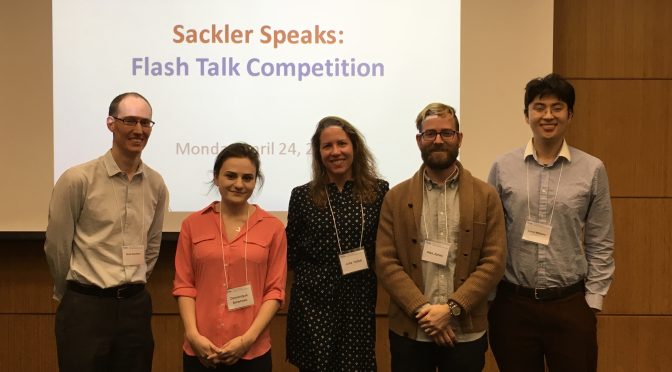The second annual Sackler Speaks Flash Talk Competition, which took place on April 24, 2017 at 5PM in Sackler 114, was an exciting opportunity for Sackler students to practice their science communication skills in front of an audience and panel of judges. Snacks, wine, and beer were served, and Aaron Bernstein (CMP, 4th year), always the dazzling host, emceed the event.
The speakers had 3 minutes to give a presentation on their research, with the option of an accompanying PowerPoint presentation. The judges were Stefan Gross, director of enzymology at Agios Pharmaceuticals and a graduate of Claire Moore’s lab, and Jonathan Garlick, a Sackler professor whose lab focuses on regenerative medicine using iPSCs.
The event had five participants who spoke in the following order: Dominique Ameroso (Neuro, 2nd year), Julia Yelick (CMDB, 4th year), Linus Williams (MD/PhD, 1st year), Brad Gardiner (CTS, MS student), and Alex Jones (Neuro, 5th year).
Every speaker brought something different to the table, but just from watching the presentations the audience got a fantastic sense of what works best for a flash talk. Some common mechanisms that most helped speakers get their points across were the use of similes to simplify complicated scientific concepts and effective use of animations and imagery in the slides, as opposed to plain text.
The judges had fifteen minutes to discuss and finally announced the winners: Julia Yelick, Dominique Ameroso, and Brad Gardiner came in 3rd, 2nd, and 1st place, respectively!
An informative discussion on what makes a great flash talk followed, led by Garlick and Gross. They both strongly agreed on the following points:
- Start with the punch line to grab the audience’s attention.
- Use your body language to communicate with the audience- don’t just cross your legs and lean on the podium! Face the group, make eye contact, be excited about what you’re talking about.
- Are you addressing the question of, “So What?”
- Is what you’re talking about relevant to your life? Is it personal? Is it easy for someone on the outside to understand why it matters?
The significance of this event taking place just two days after the March for Science should not be lost on us—the importance of clear and logical communication of scientific endeavors and achievements is obvious, especially in light of the proposed cuts to science funding. The more curiosity we pique in explaining our research, the more likely we are to receive support and funding.
All in all, the event was a success, but it would be great if more students volunteered to participate next year! This is a great opportunity to practice communication skills with your colleagues and even people from outside of the university. Keep an eye out for the announcement next year and challenge yourself to participate and possibly win a prize!

